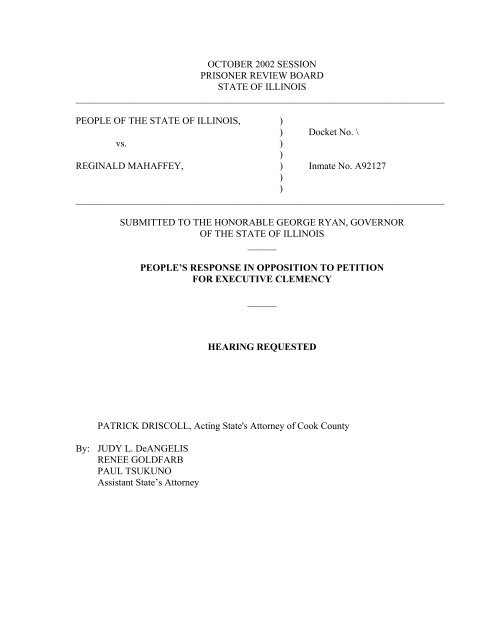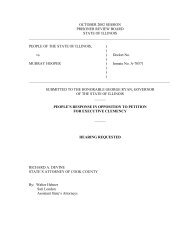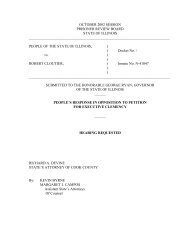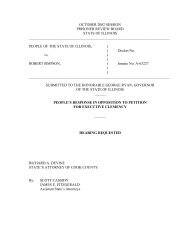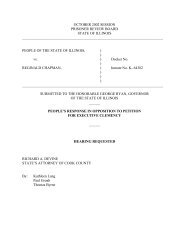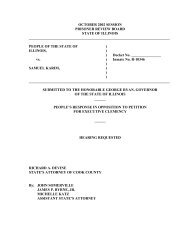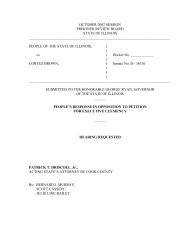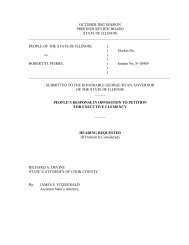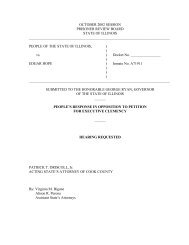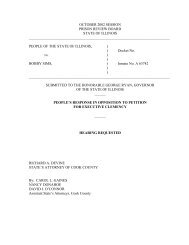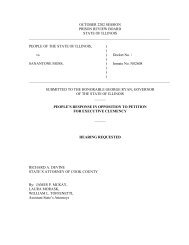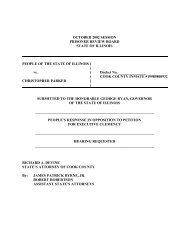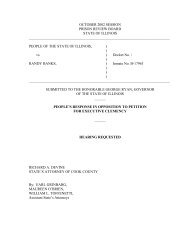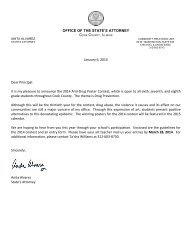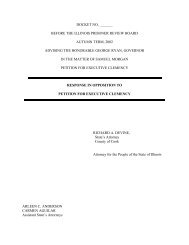Reginald Mahaffey - Cook County State's Attorney
Reginald Mahaffey - Cook County State's Attorney
Reginald Mahaffey - Cook County State's Attorney
You also want an ePaper? Increase the reach of your titles
YUMPU automatically turns print PDFs into web optimized ePapers that Google loves.
OCTOBER 2002 SESSION<br />
PRISONER REVIEW BOARD<br />
STATE OF ILLINOIS<br />
____________________________________________________________________________<br />
PEOPLE OF THE STATE OF ILLINOIS, )<br />
) Docket No. \<br />
vs. )<br />
)<br />
REGINALD MAHAFFEY, ) Inmate No. A92127<br />
)<br />
)<br />
____________________________________________________________________________<br />
SUBMITTED TO THE HONORABLE GEORGE RYAN, GOVERNOR<br />
OF THE STATE OF ILLINOIS<br />
______<br />
PEOPLE’S RESPONSE IN OPPOSITION TO PETITION<br />
FOR EXECUTIVE CLEMENCY<br />
______<br />
HEARING REQUESTED<br />
PATRICK DRISCOLL, Acting <strong>State's</strong> <strong>Attorney</strong> of <strong>Cook</strong> <strong>County</strong><br />
By: JUDY L. DeANGELIS<br />
RENEE GOLDFARB<br />
PAUL TSUKUNO<br />
Assistant State’s <strong>Attorney</strong>
OCTOBER 2002 SESSION<br />
PRISONER REVIEW BOARD<br />
STATE OF ILLINOIS<br />
____________________________________________________________________________<br />
PEOPLE OF THE STATE OF ILLINOIS, )<br />
) Docket No. \<br />
vs. )<br />
)<br />
REGINALD MAHAFFEY, ) Inmate No. A92127<br />
)<br />
)<br />
____________________________________________________________________________<br />
I<br />
HISTORY OF THE CASE<br />
Petitioner was indicted by a grand jury for the murders of Dean and Jo Ellen Pueschel,<br />
and the attempted murder of Richard (Ricky) Pueschel. Petitioner and his brother, Jerry <strong>Mahaffey</strong>,<br />
another inmate on Death Row, were jointly indicted and were tried jointly, however, petitioner’s<br />
convictions and sentence were reversed and a new trial was granted. Besides the murder and<br />
attempt murder charges, petitioner was charged with various counts of rape, deviate sexual assault,<br />
aggravated battery, residential burglary, home invasion, armed robbery, armed violence and theft.<br />
Following a jury trial presided over by the Honorable Thomas A. Hett in which petitioner appeared<br />
pro se throughout trial, petitioner was found guilty of the murders of Dean and Jo Ellen, the<br />
attempt murder of Ricky, home invasion, rape, armed robbery, aggravated battery to a child,<br />
residential burglary and theft. The same jury found petitioner eligible for the death penalty in that<br />
at least one of the murders was committed during the course of one of the charged felonies.<br />
Following the presentation of evidence in aggravation, the jury found no mitigating factors<br />
sufficient to preclude imposition of the death penalty. The trial court imposed the sentence of death<br />
1
and entered extended sentences of 60 years for attempt murder, 30 years for home invasion, armed<br />
robbery and rape of Jo Ellen, with all sentences to run consecutively.<br />
On direct appeal, the state court affirmed petitioner’s convictions and sentence of death.<br />
People v. <strong>Mahaffey</strong>, 166 Ill. 2d 1 (1995). Both a Petition for Rehearing and a petition for writ of<br />
certiorari were denied. <strong>Mahaffey</strong> v. Illinois, 516 U.S. 1045 (1995). Petitioner sought state post-<br />
conviction relief pursuant to the Illinois Post-Conviction Hearing Act (725 ILCS 5/122-1 et seq).<br />
Prior to filing an amended post-conviction petition, another fitness hearing was held. Following<br />
the trial court’s finding of fitness, defense counsel filed an amended post-conviction petition which<br />
was dismissed on the state’s motion. The state court affirmed the dismissal, People v. <strong>Mahaffey</strong>,<br />
194 Ill. 2d 154 (2000), and denied his Petition for a Rehearing. A Petition for Writ of Certiorari<br />
was denied by the United States Supreme Court. Petitioner next filed a Petition for a Writ of<br />
Habeas Corpus, pursuant to 28 U.S.C. sec. 2254, which was denied on November 13, 2001, United<br />
States ex rel. <strong>Mahaffey</strong> v. Schomig, 2001 U.S. Dist. LEXIS 18934 (N.D. Ill. Nov. 15, 2001), as<br />
well as petitioner’s Motion to Alter or Amend Judgment on November 29, 2001. Petitioner then<br />
appealed to the Seventh Circuit but was denied any relief on his claims on June 27, 2002.<br />
<strong>Mahaffey</strong> v. Schomig, 2002 U.S. App. LEXIS 15341 (No. 01-4271). Petitioner has not yet filed a<br />
Writ of Certiorari in the United States Supreme Court although he has requested a stay of the<br />
mandate pending the filing of same.<br />
2
PRE TRIAL MOTIONS<br />
II<br />
FACTS OF THE CASE<br />
Prior to petitioner’s first trial in 1984, a motion to quash arrest and suppress statements<br />
was filed by petitioner’s trial counsel, requesting that his arrest be invalidated and his confession<br />
suppressed. The bulk of the testimony with regard to the motion to quash centered on petitioner’s<br />
contention that the warrantless arrest was illegal and that there was no consent given to enter his<br />
apartment. The trial court denied the motion to quash arrest.<br />
As to the motion to suppress statements, petitioner claimed that his confession was not<br />
knowingly, voluntarily and intelligently given since he was never given his Miranda warnings and<br />
he was beaten by the arresting officers at his apartment, the officers who transported him to Area 2,<br />
and by the interrogating officer at Area 2. The arresting officers testified that, not only had they<br />
given petitioner his Miranda warnings, but no one ever beat him with a flashlight, punched him in<br />
his ribs, knocked him against the wall or put a bag over his head. The assistant state’s attorney<br />
who took petitioner’s confession stated that he never saw anyone hit petitioner, never saw any<br />
signs of petitioner being hit, and petitioner had stated to him that he had not been beaten and had<br />
been treated well while at the station. After hearing the testimony on the motion, the trial court<br />
found the officers to be credible and determined that petitioner’s confession was not beaten out of<br />
him, and that he was properly advised of his rights prior to confessing to the brutal murder of<br />
Dean, the rape and murder of his wife, JoEllen, and attempt murder of their son, Ricky. He also<br />
found that the statements given at petitioner’s apartment and during the ride to Area 2 were<br />
admissible.<br />
3
THE TRIAL<br />
On August 29, 1983, at approximately 8:00 a.m., Mr. and Mrs. Joseph Heinrich were<br />
waiting for their daughter, Jo Ellen, to bring their grandson, Ricky, to their house so that they could<br />
watch him. While waiting, Dean's place of employment called the Heinrich home inquiring as to<br />
Dean's whereabouts since he had not arrived yet for work. Because no one was answering the<br />
telephone at his daughter's house, Mr. Heinrich drove to his daughter's house, approximately ten<br />
minutes away. When he reached the house, he found his grandson, Ricky, walking outside, covered<br />
with blood. Ricky told him he was looking for the car keys to drive to his grandparents' house and<br />
that his mom and dad were dead.<br />
On August 28, 1983, the day before, Ricky, a 6th grader, had spent the entire day at his<br />
grandparents' house. He was still on summer break and was not attending school but he was<br />
participating in youth baseball. His mother picked him up that night and, at approximately 8:30<br />
p.m., Ricky went to bed. Later that night, Ricky was woken up while being held in a head-lock<br />
position. He tried to scream but a hand was over his nose and mouth. Two voices were telling him<br />
to be quiet. After blacking out for some time and then regaining consciousness, Ricky got out of<br />
bed and went into the kitchen where he saw a man holding his mother and another man coming<br />
through his back door. The two men, one of whom was petitioner, ordered he and his mother to lay<br />
on their stomachs on the dining room floor. One of the men began striking his mother with an<br />
object. She was crying and she told Ricky to listen to the men.<br />
The next thing Ricky knew, he woke up in his bed and found himself in a puddle of<br />
blood. He did not remember going from the dining room to his bedroom. He walked into the<br />
bathroom, looked at himself in the mirror and looked in his parents' room and saw his father<br />
4
"sprawled out against one of the walls" with blood near him. After walking into the dining room<br />
area, he saw his mother lying in a pool of blood at her head. She had no heartbeat. The phone was<br />
ringing but Ricky could not answer it because the receiver had been ripped off the telephone. He<br />
walked out their back door and started walking toward the alley when he met his grandfather.<br />
Paramedics soon arrived and Ricky was taken to the hospital where he stayed for<br />
approximately one week. He had suffered a fractured skull, five stab wounds in his back and his<br />
left eye was swollen shut. He also had hemorrhaging in the brain which was considered life-<br />
threatening. During his hospital stay, Ricky was accompanied by his doctor and transported by<br />
ambulance to Area 6 police station in order to view a line-up. His doctor was unhappy about Ricky<br />
going to view the line-up because Ricky was not completely recovered from the head injury "by<br />
any means." Ricky was unable to identify either of the two men who were in his apartment that<br />
night because he was in a daze and was not sure of himself at the time of the line-up.<br />
At trial, Ricky was 99% sure that petitioner was one of those men. The description of<br />
the two men that he gave the police was that one was a light complected black or Latino, while the<br />
other was shorter and a darker complected black man. Ricky believed petitioner to be the lighter<br />
complected man. Petitioner's picture in the newspaper following petitioner's attempt escape from<br />
jail did not play a part in Ricky's identification of petitioner.<br />
Sgt. Pierczynski was a patrol sergeant on August 30, 1983 for the 13th District, Chicago<br />
Police Department. At approximately 1:15 p.m. on that day, Pierczynski was sitting in a marked<br />
patrol car when he was approached by an elderly black man who told him that there was a vehicle<br />
parked in the "project" at 2245 West Lake Street which appeared to be "out of place." When<br />
Pierczynski arrived at the lot where the car was parked, he saw a red sports car. The license plate<br />
5
on the car, J-O-Z-Z, matched the plates which were given on an all-call broadcast earlier that day<br />
for a 1982 red Camaro owned by Jo Ellen Pueschel.<br />
Detective Anthony Graffeo with the Chicago Police Department, Area 6 Violent Crimes<br />
division, arrived at 2519 West Jerome at approximately 9:30 a.m. He entered the apartment where<br />
he saw one of Ricky's bats, covered with blood and at least one knife on top of the kitchen counter.<br />
In the dining room, he saw the body of Jo Ellen lying in a pool of blood, dressed only in a blue<br />
night gown with no underclothing. She had a two inch slit in her scalp, her right eye was swollen<br />
shut and her face was battered and bloody. Upon walking through the apartment, he saw blood on a<br />
linen closet door in the hallway area. He entered one of the bedrooms which was in disarray and<br />
which had blood throughout with another one of Rickey's bats covered with blood. Lying face<br />
down on the floor was Dean, dressed in blue jogging shorts, covered with blood on his back and<br />
eight visible puncture wounds and a contusion on his eye. Various gun paraphernalia were under<br />
the bed near his body. An empty gun rack was above. Laying next to his body was an empty gun<br />
holster, a belt, and some shotgun shells. A jewelry box on a dresser near the body had been opened.<br />
A t-shirt with blood and "slice" marks was found in Ricky's bedroom, and drops of blood were<br />
found in the bathroom sink.<br />
One of the arresting officers, Sergeant Byrne, testified that he and his partner, Detective<br />
Grunhard responded to a radio call and proceeded to 95th and the Dan Ryan at about 2:00 a.m. on<br />
September 2, 1983. There, he met Sergeant Jackson who had Cedric <strong>Mahaffey</strong> (petitioner’s<br />
brother) seated in his squad car. Byrne called Area Six Violent Crimes and learned about the<br />
proceeds that had been taken from the home where the murders had occurred. Byrne went back to<br />
the car and asked Cedric what kind of guns had been taken.<br />
6
After further speaking with Cedric, they proceeded to 3534 W. 13th Place where<br />
petitioner was staying. The officers showed their badges when the door was opened by a man<br />
named Morriell Redmond and asked if <strong>Reginald</strong> <strong>Mahaffey</strong> was in the apartment. After Redmond<br />
told them they could search his apartment, Yucaitis and Byrne walked to the rear and they saw the<br />
body of a black male lying on the floor. Petitioner told the officers his name, and he was told he<br />
was under arrest. Byrne saw a .357 Magnum revolver on the nightstand next to where <strong>Reginald</strong> had<br />
been lying which was recovered.<br />
Byrne further stated that the first thing petitioner said after his arrest was that he knew<br />
that the police officers were "coming after" him and that he knew he was "going to get caught."<br />
Petitioner continued to talk, stating that he and his brother had gone to the northside to commit a<br />
burglary but their van broke down. As they were walking from the van, they found an open<br />
window, crawled through the window of the first floor apartment into the bathroom. They went<br />
into a bedroom and beat a young boy and stabbed him, and entered another bedroom where they<br />
beat a man and woman to death. Petitioner said they took 3 guns, a .357 Magnum, a shotgun and<br />
carbine rifle, together with jewelry, video equipment, a VCR, an Atari game and video cassettes.<br />
Grunhard removed from a nearby closet a dust cover for a turntable which contained twenty-four<br />
pieces of jewelry, all of which were identified by Byrne and by Josephine Heinrich as belonging to<br />
either Dean, Jo Ellen or Ricky. Also removed from the bedroom where petitioner was lying were<br />
boxes containing .30 caliber carbine bullets and .12 gauge shotgun shells. At this point, petitioner<br />
said that the officers had "most of what [petitioner and his brother] got" and that his brother had a<br />
VCR, Atari game and some cassettes.<br />
7
Byrne and Grunhard returned to Area 2 Headquarters where all the recovered proceeds<br />
were placed on a long table. As Byrne, Yucaitis and petitioner stood next to the table, petitioner put<br />
his left hand out and removed from his third finger a white metal ring with a blue stone center.<br />
Petitioner reached into his trouser pocket and pulled out a man's Seiko watch and a gold chain with<br />
a crucifix. He handed all items to the detective and said that the items belonged with everything on<br />
the table.<br />
Joseph Heinrich, Jr., Jo Ellen's brother, identified the Remington .12 gauge shotgun, the<br />
universal caliber Carbine rifle and the .357 Smith and Wesson revolver as belonging to Dean<br />
Pueschel. Jo Ellen's mother, Josephine, identified various items of jewelry recovered from<br />
petitioner's apartment as belonging to Dean, Jo Ellen and Ricky. Specifically, she identified the<br />
crucifix given to Dean by his mother, his ring and his watch which were recovered from petitioner.<br />
Pam Fish, a forensic scientist in the serology unit of the Chicago Police Department<br />
crime lab, testified that she ran tests on certain evidence gathered from the crime scene including<br />
bloody bats, blood taken from the victim's bodies and a vaginal swab taken from Jo Ellen. One of<br />
the bats had Jo Ellen's type blood, while the other had Dean's type blood. The vaginal swab tested<br />
positive for the presence of spermatozoa. Ms. Fish also tested the .357 revolver which had blood<br />
traces which were consistent with Jo Ellen's blood type. During cross-examination, Ms. Fish<br />
explained that petitioner was a "non-secretor" which meant that his semen did not secrete his blood<br />
type. She could not determine the blood type from the vaginal swab taken from Jo Ellen because<br />
the vaginal swab did not reveal the presence of activity for any blood type.<br />
8
MAHAFFEY’S CONFESSION<br />
According to Assistant <strong>State's</strong> <strong>Attorney</strong> Irving Miller, on September 2, 1983, he went to<br />
Area 2 where, at approximately 9:30 a.m., he entered a small room where petitioner was being<br />
held. (R. 1555-57) He requested that petitioner's handcuffs be removed and he proceeded to<br />
introduce himself as a lawyer working with the police and that he was not his lawyer. (R. 1558) He<br />
advised petitioner of his Miranda rights and petitioner indicated that he understood his rights. (R.<br />
1558-59) He first spoke with petitioner, and after speaking with Jerry <strong>Mahaffey</strong> for approximately<br />
20-30 minutes, Miller returned to petitioner's room where he confronted petitioner, telling him that<br />
he believed that petitioner had lied during their first conversation. (R. 1559-59A) Petitioner<br />
admitted having lied and admitted that he had sex with Jo Ellen Pueschel. (R. 1560)<br />
Miller had the various items from the long table brought into a larger room where he<br />
proceeded to take a "court-reported" statement from petitioner. (R. 1561-62) At that time,<br />
petitioner repeated his earlier statement that he had no complaints about the treatment by the<br />
police. (R. 1563) After being advised of his rights another time, petitioner gave a 23-page<br />
statement which detailed the events of August 29, 1983 and on which he corrected errors, initialed<br />
and signed. (Supp. Record and R. 1568-1611) Petitioner stated that he and his brother Jerry<br />
planned to burglarize a clothing store on the northside of the city. (R. 1573) They left at<br />
approximately 2:30 a.m. and drove a borrowed tan/brown van to Howard Street near Western<br />
Avenue in order to stake out a certain clothing store. (R. 1574-75) The particular store they had in<br />
mind was "not fit" because of excessive traffic so they decided to "check out" a different clothing<br />
store, only to have the battery in the van die. (R. 1576-77) They locked the van, walked through a<br />
parking lot and noticed that one of the apartments in the apartment building had an open window.<br />
9
(R. 1578) Petitioner said he removed the screen to the bathroom window and his brother was the<br />
first to go inside. (R. 1578) They saw someone in a side room and they entered the kitchen, drank<br />
some Kool-Aid from the refrigerator, and took some money from a wallet which was sitting on the<br />
kitchen table. (R. 1579) Petitioner picked up a butcher knife which had a blade one inch wide at the<br />
bottom and approximately 5 inches long. (R. 1580) They entered the "kid's room,” and his brother<br />
said "man, it's a boy." (R. 1580) Petitioner got on top of Ricky's back and pulled a pillow over his<br />
head, telling him not to make any noise and that everything would be "all right." (R. 1581)<br />
Petitioner proceeded to choke him while Jerry held Ricky's mouth with a pillow. (R. 1582) Ricky<br />
attempted to call for help and struggled with petitioner and his brother. (R. 1582) Petitioner told<br />
Jerry to stab him so Jerry stabbed him, according to petitioner, "I don't know how many times." (R.<br />
1582) Petitioner discovered a basket of bats in Ricky's room and Jerry hit Ricky over the head a<br />
couple of times. Petitioner could not remember if Ricky was stabbed or clubbed first. (R. 1583)<br />
Petitioner picked up a bat and went into the other room where he thought were two ladies because<br />
of the "long hair." (R. 1584) Petitioner stood on the left side of the bed while Jerry stood on the<br />
right, both carrying bats. (R. 1584) They both, simultaneously, hit Dean Pueschel in the head with<br />
the baseball bats. (R. 1585) Jo Ellen awoke while Jerry was still hitting her husband a few more<br />
times with the bat and petitioner told her to "be quiet," that "she would be all right". (R. 1586) He<br />
took her into the kitchen where he began to have sexual intercourse with her and finished the act<br />
over the arm of a couch in the living room. (R. 1587) While he was still having sex with Jo Ellen,<br />
Jerry emerged from the bedroom with a .357 magnum and said, "[M]an, this mother fucker had a<br />
big pistol." (R. 1587) Jerry called Jo Ellen a "bitch" and told her to tell them where the other pistols<br />
were. (R. 1588) Petitioner returned to the bedroom where Dean was lying face-up on the floor and<br />
10
looked at the jewelry box on the dresser. (R. 1588) He took some jewelry and a t-shirt from a<br />
dresser drawer. (R. 1588) Petitioner returned to the room where Jerry was having sex with Jo Ellen<br />
"in the mouth." (R. 1589) Petitioner told her everything was going to be all right if she cooperated.<br />
Jo Ellen told petitioner that Jerry was being "rough with her" and petitioner said, "just go along<br />
because [you] really ain't got no choice." (R. 1590)<br />
Petitioner asked Jo Ellen where the car keys were. (R. 1590) She gave him the keys and<br />
told him there was an alarm on the car. (R. 1591) Petitioner told her that "it would be just as bad<br />
for her as it might be for [him]" and she put on a brown trench coat, went outside and de-alarmed<br />
the car. (R. 1591-92) Petitioner packed "a few distinguished items like the TV machine, tape player<br />
and the arcade game" and some tapes and put them in a box with some jewelry, the rifle, shotgun<br />
and .357 magnum. (R. 1592) The assistant state's attorney pointed to the various items mentioned<br />
by petitioner and petitioner identified each one as having been taken from the apartment. (R. 1593)<br />
Petitioner also stated that they took a box of "30/30 shells," two boxes of 12 gauge shells, one box<br />
of 38 special and one box of .357 "mags" which he identified during his statement. (R. 1595)<br />
Petitioner further stated that after he loaded the "merchandise" into the car, he returned<br />
inside the house and hit Jo Ellen in the head with the .357. (R. 1596) He told her to lay down. (R.<br />
1596) Her son mumbled, "Mom, lay down, just lay down, Mom." (R. 1596) As she was trying to<br />
say something, petitioner hit her "a couple of times on the head" with the pistol while her son lay<br />
right next to her. (R. 1597) As he was leaving the house, he again told Jo Ellen that she was going<br />
to be all right and she "kind of believed" him. (R. 1597-98) Jerry told petitioner that they had to<br />
"kill this bitch, too" and petitioner said, "I know, man. Don't make her panic." As petitioner was<br />
leaving, he heard "solid hits" which told him that "[Jerry] was finishing the lady and her son off<br />
11
with the bats, you know. I didn't know for sure. I only thought that." (R. 1598) Petitioner also told<br />
Jerry to stab the "little boy." (R. 1599)<br />
After leaving the apartment, petitioner started the car and waited for about four minutes<br />
for Jerry to come out of the apartment. (R. 1599) Petitioner drove the car south on Western Avenue<br />
toward the expressway. (R. 1600) They went to 3534 West 13th Place where petitioner was staying<br />
at the time and loaded the "goods" into the house. (R. 1600) Petitioner put the jewelry in an ice<br />
dish and told Jerry that they had to "get rid of the car." (R. 1601) They proceeded to the projects at<br />
2245 West Lake Street and left the car in a back parking lot, hoping that somebody would steal it<br />
so that any fingerprints petitioner may have left would have been "no good." (R. 1601) The two<br />
took a bus to 13th Place. (R. 1602) The following Tuesday, petitioner and Jerry moved some of the<br />
proceeds to their other brother's house. (R. 1603) Petitioner kept a "few choice pieces of jewelry,"<br />
the shotgun and the .357 magnum, while Jerry took the rifle, Zenith tape player and tapes. (R.<br />
1603) Petitioner took the arcade game and small portable TV to another brother's house. (R. 1603)<br />
During his arrest, petitioner said that he told the police where the .357 was, that they<br />
discovered the shotgun in the closet and that he was wearing certain of the jewelry which he gave<br />
to the detective at the police station, including Dean’s wedding ring. (R. 1604-05) When shown a<br />
photograph of Jo Ellen, Dean and Ricky by the assistant state's attorney, petitioner responded,<br />
"Those are my victims." (R. 1606) After the court-reporter typed the statement, petitioner reviewed<br />
it for corrections, making certain corrections which he initialed. (R. 1608-1611)<br />
Following the People's introduction of 94 trial exhibits into evidence, the state rested and<br />
petitioner presented no testimonial evidence in the defense case-in-chief. (R. 1656-57, 1690-92)<br />
12
Petitioner did introduce into evidence a line-up photo which was taken on September 2, 1983. (R.<br />
1656, 1691)<br />
Following closing arguments and the trial court's instructions to the jury, the jury<br />
returned verdicts of guilty for the murders of Dean and Jo Ellen, the attempt murder of Ricky,<br />
home invasion, rape, armed robbery, aggravated battery to a child, residential burglary and theft.<br />
The trial court admonished petitioner regarding his right to counsel at the sentencing hearing. At<br />
that time, Kevin Smith, the public defender who sat with petitioner at counsel table throughout the<br />
trial, stated to the court that he did not believe that petitioner was fit for sentencing. Based on this<br />
statement, and over the prosecution's objection, the trial court requested that Dr. Reifman from the<br />
Psychiatric Institute examine petitioner for fitness.<br />
Three days following his examination, Dr. Reifman testified that petitioner met the legal<br />
requirements and standards for fitness to be sentenced. He found petitioner to be stupid and that he<br />
used poor judgment but such was not a result of a mental condition which would render him unfit<br />
for sentencing. According to Reifman, petitioner's closing argument following trial was not a<br />
product of a person "mentally diseased" but the product of a person who is not very smart.<br />
Petitioner had the capacity to understand but had a lack of knowledge and could not prepare a trial<br />
because he's not a lawyer. Dr. Reifman was aware that petitioner had a borderline or below average<br />
intelligence but did not believe that petitioner had an organic delusional disorder. The doctor had<br />
seen petitioner on previous occasions, including the time period when he was organic or brain<br />
damaged from his fall in 1985. At that time petitioner was not organically deluded which is when<br />
he would have been, if it all. Petitioner may have developed a functional delusion but the doctor<br />
did not believe petitioner had an organic delusion. Petitioner's religious conversion was also not<br />
13
significant enough to be considered the product of a mental disease. According to Reifman,<br />
petitioner was stupid but stupidity is not a mental disease. The prosecution then presented its<br />
evidence during the eligibility stage and the jury found petitioner eligible for the death penalty<br />
based on the aggravating factor that petitioner committed murder during the course of a felony.<br />
DEATH PENALTY HEARING<br />
Following petitioner’s opening argument to the jury at the second stage of the hearing,<br />
the prosecution presented Dr. Reifman who testified that petitioner was not suffering from a mental<br />
disease, but that he did suffer from what he believed to be an anti-social personality disorder.<br />
Reifman's opinion was that petitioner was fit for sentencing. The prosecution then presented<br />
various witnesses who testified as to petitioner’s prior criminal acts including a robbery of a White<br />
Castle restaurant in 1980, a burglary both at a used car dealership in 1978 and at a general<br />
merchandise store in 1979. Further aggravating evidence was introduced regarding petitioner's<br />
unsuccessful escape attempt from the <strong>Cook</strong> <strong>County</strong> Department of Corrections. (R. 2048-2066,<br />
2141-2149, 2170-2178, 2197-2200)<br />
After the prosecution rested in aggravation, closing arguments were presented by both<br />
parties and the jury found that there were no mitigating factors sufficient to preclude the imposition<br />
of the death penalty. The trial court subsequently sentenced petitioner to death, with an extended<br />
term of 60 years for the attempt murder, 30 years for home invasion, armed robbery and rape, with<br />
all sentences to run consecutively.<br />
14
III<br />
REASONS FOR DENYING THE PETITION<br />
REGINALD MAHAFFEY DOES NOT<br />
DESERVE EXECUTIVE CLEMENCY IN<br />
ANY FORM WHERE HE ADMITTED THAT<br />
HE AND HIS BROTHER JERRY MAHAFFEY<br />
INVADED THE HOME OF DEAN AND JO<br />
ELLEN PUESCHEL AND BRUTALLY<br />
MURDERED BOTH OF THEM AND TRIED<br />
TO KILL THEIR ELEVEN YEAR-OLD SON,<br />
WHO, BY THE GRACE OF GOD, SURVIVED<br />
THE ATTACK ALTHOUGH HE WATCHED<br />
HIS MOTHER AND FATHER BEING<br />
KILLED BY TWO SADISTIC MONSTERS.<br />
Although <strong>Reginald</strong> <strong>Mahaffey</strong> is trying to claim that he is actually innocent of the<br />
murders of Dean and JoEllen Pueschel and the attempt murder of their eleven year old son, Ricky,<br />
he never made that inane, unsupported claim until he presented such claim to the federal courts,<br />
seventeen years after the murders. Even so, every court which has heard his cries have completely<br />
rejected anything he has had to say, including any attempt to claim that his “other brother” did it.<br />
<strong>Mahaffey</strong>’s arguments to this Board are not only ludicrous, they are utterly appalling. <strong>Mahaffey</strong> is<br />
not actually innocent of the crimes he committed, nor is he deserving of any relief on any of his<br />
claims, ever. It would not only be “just” to execute <strong>Reginald</strong> <strong>Mahaffey</strong>, it will be welcomed by the<br />
surviving victim of the attack, Ricky Pueschel, as well as his entire family who have endured<br />
twenty years of unbearable pain and suffering since the horrible murders were committed by<br />
petitioner and his brother. <strong>Reginald</strong> <strong>Mahaffey</strong> is the “poster child” for the death penalty and his<br />
victims’ family members deserve to see him executed. They can only hope and pray that he will<br />
then burn in hell.<br />
15
Petitioner asserts that he is entitled to clemency because he did not receive the benefit of<br />
the changes to the Illinois capital sentencing system which have recently been adopted, proposed<br />
or enacted. By relying upon a laundry list of new Supreme Court Rules, statutes and proposals<br />
from the Governor’s Commission on Capital Punishment which were not available at the time of<br />
his trial, petitioner claims that his trial (as well as that of every other capital defendant in Illinois)<br />
was by definition fundamentally unfair. However, the Illinois Supreme Court has expressly<br />
rejected the claim “that every capital trial has been unreliable and that all appellate review has been<br />
haphazard” (People v. Hickey, ___ Ill. 2d ___, 2001 Ill. LEXIS 1080 at *57 (No. 87286 September<br />
27, 2001)). Rather, the Court held that the additional safeguards included in its rules governing<br />
capital cases are not retroactively applicable because they “function solely as devices to further<br />
protect those rights given to defendants by the federal and state constitutions” and that “[a]<br />
violation of procedures designed to secure constitutional rights should not be equated with a denial<br />
of those constitutional rights.” Id. at *63, 64.<br />
Thus, the fact that the Court, the General Assembly and the Governor’s Commission<br />
have endeavored to improve the process does not mean that an injustice would result simply<br />
because the recent changes were not applied retroactively to petitioner’s case. Instead, a true<br />
injustice would only result if it were reflexively determined that petitioner’s trial was<br />
fundamentally unfair without any examination of the proceedings themselves. It is telling,<br />
however, that petitioner has not even attempted to demonstrate how the recent changes would have<br />
affected the outcome of the proceedings. Moreover, petitioner ignores the fact that every court<br />
which has examined the proceedings in his case determined that they were fundamentally fair and<br />
that he was not unduly prejudiced in any manner.<br />
16
First, petitioner asserts that he is entitled to clemency because he did not receive pretrial<br />
discovery pursuant to Ill. S.Ct. Rule 416 and that the new Supreme Court Rules governing capital<br />
cases were not applicable to his proceedings. However, the Illinois Supreme Court has clearly held<br />
that the amendments to its rules are not retroactively applicable. Hickey, 2001 Ill. LEXIS 1080 at<br />
*65. Thus, petitioner is not deserving of any relief based on the new rules.<br />
Next, petitioner seeks clemency because his custodial interrogation was not videotaped<br />
or electronically recorded. Under the Governor’s Commission’s proposals, statements and the<br />
interrogations leading up to them should be videotaped. What petitioner fails to recognize is that<br />
neither the Commission nor the governor himself call for the suppression of a statement simply<br />
because it was not videotaped. Rather, even under the Governor’s proposed legislation (HB3717<br />
& HB2058), such statements will still be admissible if the trial court finds that it was voluntarily<br />
made after considering the totality of the circumstances. Contrary to Petitioner’s claims, he was not<br />
beaten while he was confessing to the horrific rape and murder of Jo Ellen and Dean Pueschel as<br />
was clearly evident from the written confession itself and every word which was uttered in the<br />
courtroom during the Motion to Suppress hearing. Moreover, Judge Hett reviewed the totality of<br />
the circumstances and found that, not just by a preponderance of the evidence, but, beyond a<br />
reasonable doubt, petitioner’s confession was not obtained by coercion. Although petitioner claims<br />
throughout his petition that he was beaten by Jon Burge and the team at Area 2, such accusation is<br />
a lie. In fact, the record in this case proved that petitioner never demonstrated physical injuries<br />
commensurate with his allegations of police brutality, nor did he ever complain at the time of<br />
interrogation, or immediately thereafter, that he was beaten during his arrest or was coerced into<br />
confessing. He even admitted in his confession that he had been treated “okay,” that he had no<br />
17
“complaints about the way the police treated” him, that he was given food and coffee, and no<br />
threats or promises were made to him to induce him to confess. (Supp. R. 23) Simply put, this<br />
record proves that <strong>Mahaffey</strong> has lied about any alleged abuse and his attempt to continue to lie<br />
must now be stopped. There is not one shred of evidence to substantiate any alleged torture which<br />
petitioner claims he was subjected to by Area 2 officers. Nonetheless, even without his confession,<br />
every court which has reviewed this case has found that the evidence of petitioner’s guilt was<br />
overwhelming and that the prosecution did not even need his confession to prove that he brutally<br />
raped and murdered the Pueschels. As the courts have found:<br />
[a]part from defendant's confession, the State presented<br />
evidence at trial to prove defendant guilty beyond a<br />
reasonable doubt. Richard Pueschel, who was 11 years old<br />
at the time of the offenses and was 18 at the time of trial,<br />
provided an in-court identification of defendant as one of<br />
two men he saw in the apartment the night of the crimes,<br />
testifying that he was "99% sure " that defendant was<br />
there. "99% sure" may not be sufficient identification of<br />
defendant as the perpetrator of the crime, particularly in a<br />
capital case. However, Richard Pueschel's identification of<br />
defendant is corroborated by evidence that at the time of<br />
his arrest, shortly after the murders were committed,<br />
defendant was in possession of jewelry and weapons taken<br />
from the Pueschel home at the time of the commission of<br />
the crimes. Specifically, the jury heard evidence that<br />
numerous items of personal property which were stolen<br />
from the Pueschel's residence were found in defendant's<br />
apartment, including two dozen pieces of jewelry<br />
identified as belonging to either Jo Ellen, Dean or Richard<br />
Pueschel. The jury also heard evidence that, at the police<br />
station following defendant's arrest, defendant removed a<br />
man's ring from his hand and a watch from his back<br />
pocket, stating that these items belonged with the other<br />
pieces of property that had been seized from his<br />
apartment. The ring and watch were identified at trial as<br />
also belonging to Dean Pueschel. In addition, the loaded<br />
.357 Magnum revolver recovered from defendant's night<br />
stand, as well as a shotgun recovered from defendant's<br />
18
closet, were identified as belonging to the Pueschels.<br />
Under the totality of the evidence, our review of this<br />
record convinces us that in light of the overwhelming<br />
evidence establishing defendant's guilt, confidence in the<br />
outcome of defendant's trial is not undermined, even<br />
assuming the claimed error. <strong>Mahaffey</strong>, 194 Ill. 2d at 179-<br />
180. (emphasis added)<br />
Videotaping or an electronic recording of petitioner’s confession would have only helped the<br />
prosecution, not petitioner. Moreover, because the jury was instructed pursuant to Illinois Pattern<br />
Instruction 3.06-3.07 to consider all the evidence when determining whether or not petitioner made<br />
the statement and how much weight it should be given, petitioner cannot complain that he was<br />
prevented from asserting at trial that his statement was unreliable and should not be considered.<br />
Petitioner additionally claims that he is entitled to clemency because he requested a<br />
lawyer while he was being interrogated but was not appointed an attorney until he appeared in<br />
court. He points out that under the Governor’s Commission proposals, the public defender would<br />
be allowed to represent any suspect in a potentially capital case who requests to speak to a lawyer<br />
during an interrogation. However, petitioner fails to mention that the record does not support his<br />
claim, nor has he ever claimed in twenty years since the day of his arrest that he ever requested a<br />
lawyer at the police station. Therefore, even if this proposal had been in effect at the time of<br />
petitioner’s arrest, it would not have applied to him.<br />
Petitioner further seeks clemency because witness interviews were not electronically<br />
recorded. However, petitioner was provided with all of the witness’ names prior to trial and he was<br />
certainly not surprised by the fact that Ricky testified at trial, especially where petitioner was the<br />
one who did not stab Ricky enough or hit him enough with a baseball bat to kill him, but only<br />
maim him. Further, petitioner represented himself and had access to everything that was being<br />
19
presented in the prosecution of his case. Also, petitioner’s trial was actually his second jury trial.<br />
The same witnesses who testified in petitioner’s first trial also testified at his second trial.<br />
Therefore, petitioner was well aware of whom the witnesses were and the substance of their<br />
testimony. Moreover, petitioner has failed to demonstrate how the outcome of his trial would have<br />
differed had Ricky’s interview been electronically recorded. Finally, petitioner could have<br />
interviewed Ricky prior to trial and could have electronically recorded those interviews. Petitioner<br />
chose not to do so.<br />
Moreover, petitioner’s reliance on Ricky’s inability to choose petitioner out of a line-up<br />
is inane where the record proved that Ricky had not yet recovered from the head injuries he had<br />
suffered, at petitioner’s hands, “by any means” and he was in a daze at the time of the lineup. (R.<br />
1162-63, 1177-78, 1529-30) Moreover, petitioner’s accusation that Ricky was “unsure” about his<br />
in-court identification is simply wrong, given Ricky’s testimony that he was “99% sure” that<br />
petitioner was one of his parent’s murderers. Petitioner is not deserving of executive clemency on<br />
this claim.<br />
Petitioner next alleges that his death sentence should be commuted because he is<br />
mentally retarded. There is absolutely no evidence that has ever been presented in any proceeding<br />
throughout the years since the murders of Dean and JoEllen Pueschel to support, or prove, that<br />
<strong>Mahaffey</strong> is mentally retarded. Also, there has been no evidence presented, ever, to prove that<br />
petitioner suffers from reduced mental capacity or has a history of extreme emotional or physical<br />
abuse. In fact, the testimony presented after all of petitioner’s fitness examinations prove that<br />
petitioner was fit to stand trial and that according to every qualified expert that has ever examined<br />
petitioner, petitioner merely has a personality or character disorder, an anti-social personality<br />
20
disorder, which was not a mental illness but was simply a specific type of personality functioning.<br />
He is not mentally retarded, by any means. It is important to note that the petitioner represented<br />
himself during his second jury trial. The record bears out that petitioner asked many relevant<br />
questions on cross-examination of the People’s witnesses, including the examination of Ricky<br />
Pueschel. Petitioner cross examined virtually every witness, probing his/her testimony completely.<br />
He gave a closing argument, discussing the lack of fingerprint evidence (R. 1718), the unreliability of<br />
Ricky’s in-court identification (R. 1730, 1797), and told the jury to weigh the evidence (R.1729). He<br />
asked the jury to return a not guilty verdict (R. 1734). Just because he failed to convince the jury<br />
doesn’t mean he is mentally retarded.<br />
Petitioner next claims that he is deserving of clemency because he was convicted based<br />
in part on the testimony of an eyewitness who viewed a line-up prior to the in-court identification<br />
and that the Governor’s Commission recommendations were not available at the time of the line-<br />
up. Petitioner fails to point out that the line-up resulted in no identification by the eyewitness,<br />
Ricky Pueschel, since Ricky had been in the hospital, recovering from the horrible injuries which<br />
should have killed him, but, by the grace of God, they did not. In fact, Ricky’s doctor was very<br />
angry that Ricky went to view the line-up because Ricky was not completely recovered from the<br />
head injury "by any means." Again, Ricky was unable to identify either of the two men who were<br />
in his apartment that night because he was in a daze and was not sure of himself at the time of the<br />
line-up. Thus, the Commission recommendations would have been meaningless to petitioner on<br />
this claim.<br />
Petitioner also seeks clemency because the forensic evidence used against him at trial<br />
was analyzed by a state police forensic laboratory as opposed to an independent laboratory. The<br />
21
forensic expert was Pamela Fish and she has never been found to have been remiss in any of her<br />
work in this case. Moreover, there has never been a judicial opinion written by any court of law<br />
that Ms. Fish engaged in a “pattern of overstating results in favor of the prosecution,” contrary to<br />
petitioner’s unsupported claim in his Petition.<br />
Nonetheless, petitioner was aware that a very small portion of the evidence the State<br />
intended to present in their case consisted of forensic evidence. Petitioner could have obtained an<br />
independent analysis, however, he never requested one at any point prior to or during the trial.<br />
Petitioner never requested an independent analysis during the post-conviction proceedings.<br />
Petitioner never requested an independent analysis during the federal court proceedings. Further,<br />
Petitioner’s present claim ignores the fact that the trial court, the Illinois Supreme Court, the<br />
District Court and the Seventh Circuit Court of Appeals have upheld the integrity of the evidence.<br />
Petitioner also ignores the fact that the jury heard the evidence, and after considering the credibility<br />
of the witness and all the attendant circumstances, deemed the testimony reliable.<br />
Petitioner further asserts that he is entitled to clemency because he was found eligible<br />
for the death penalty based upon an aggravating factor other than those factors which the<br />
Governor’s Commission has recommended be retained. Specifically, the Commission concluded<br />
that the current list of 20 factors is overly expansive and therefore unconstitutional. Accordingly,<br />
it was suggested that the list be reduced to just five factors: (1) murder of a peace officer or<br />
fireman; (2) murder of any person in any correctional facility; (3) multiple murder; (4) murder<br />
accompanied by the intentional infliction of torture; and (5) murder of a witness, prosecutor,<br />
defense attorney, juror, judge or investigator.<br />
22
Petitioner was convicted of killing two people. Thus, he was eligible for the death<br />
penalty as a multiple murderer even though the jury did not find him eligible under this factor.<br />
However, petitioner qualified for the death penalty, and was found eligible by the jury<br />
for the death penalty, where he committed the murders while he was committing numerous other<br />
felonies, including rape, armed robbery, attempt murder, aggravated battery of a child, home<br />
invasion, residential burglary and theft. The Illinois Supreme Court has expressly rejected the<br />
Commission’s logic and held that Illinois’ death penalty statute satisfies the constitutional mandate<br />
because it “genuinely narrows the class of individuals eligible for the death penalty and reasonably<br />
justifies imposition of a more severe sentence on those defendants compared to others found guilty<br />
of first degree murder.” People v. Ballard, ___ Ill. 2d ___, 2002 Ill. LEXIS 376 at *73 (No. 88885<br />
August 29, 2002) (citing Zant v. Stephens, 462 U.S. 862, 877, 103 S. Ct. 2733, 2742 (1983)). As<br />
the Ballard court explained, “there are innumerable examples of first-degree murders that do not fit<br />
within any of the statute's eligibility factors” and “each provision is narrowly tailored to fit a<br />
specific set of facts and circumstances.” Id., 2002 Ill. LEXIS 376 at *74.<br />
Moreover, each of the aggravating factors represents a determination by the General<br />
Assembly that certain types of murders are so deplorable that the death sentence may be imposed.<br />
Each one is intended to ensure that the most helpless members of our society (such as children, the<br />
elderly or disabled) are protected against violence or to provide a strong disincentive for the<br />
offender to kill the victim. For example, cold, calculated and premeditated murders are properly<br />
death-eligible because they are limited to situations where the defendant has carefully planned the<br />
murder over an extended period of time, and the availability of the death penalty may be the only<br />
thing which prevents these defendants from deciding to actually kill their victims. As the Illinois<br />
23
Supreme Court stated “a defendant who contemplates a murder for a substantial period of time, yet<br />
still commits it, is set apart from other murder defendants in a meaningful way.” People v.<br />
Williams, 193 Ill. 2d 1, 36, 737 N.E.2d 230 (2000). Similarly, murders in the course of another<br />
felony are properly death eligible to help deter the defendant from killing the victim. Regardless of<br />
the above, petitioner DID commit the murders following the infliction of torture; he tortured Dean<br />
and JoEllen, as well as Ricky, even though Ricky survived. Petitioner deserves to die.<br />
Petitioner claims his sentence should be reduced because the State’s <strong>Attorney</strong>’s decision<br />
to seek death was made without uniform protocols to guide his discretion and was not approved by<br />
a state-wide review committee. However, it has long been recognized by the Illinois Supreme<br />
Court that the <strong>State's</strong> <strong>Attorney</strong> is endowed with the exclusive discretion to decide which of several<br />
charges shall be brought, or whether to prosecute at all. A prosecutor's discretion extends to<br />
decisions about whether or not the death penalty should be sought.” People v. Jamison, 197 Ill. 2d<br />
135, 161-62, 756 N.E.2d 788 (2001). Therefore, any attempt to mandate such a review would<br />
constitute an impermissible restriction on the independence of the various State’s <strong>Attorney</strong>s under<br />
the Illinois Constitution. Moreover, petitioner does not even allege much less argue that the<br />
decision to seek death in his case was the result of an abuse of discretion. Accordingly, it must be<br />
rejected.<br />
Petitioner next claims that he is entitled to clemency because eyewitness testimony was<br />
presented against him at trial and he did not have the opportunity to present expert testimony<br />
concerning the problems associated with eyewitness testimony. Petitioner never requested that<br />
expert testimony be permitted to rebut Ricky’s eyewitness testimony and he certainly has not<br />
presented evidence as to how such expert testimony would have helped him.<br />
24
Petitioner asserts that he is entitled to clemency because he was denied adequate funding<br />
to investigate the case and/or to retain the necessary expert witnesses. However, despite the<br />
creation of the Capital Litigation Trust Fund, there is no indication that any capital defendant in<br />
Illinois, particularly those prosecuted in <strong>Cook</strong> <strong>County</strong> has ever been deprived of the necessary<br />
funds to investigate or retain appropriate experts. Rather, courts have denied various requests<br />
which are deemed unreasonable or unnecessary, the same standard which applies for funds under<br />
the Capital Litigation Trust Fund. 725 ILCS 124/15(c). Also, the <strong>Cook</strong> <strong>County</strong> Public Defender<br />
has significant resources available for capital litigation. Therefore, the mere fact that the Capital<br />
Litigation Trust Fund was not created until 2000 is irrelevant.<br />
Petitioner complains that his jury was not instructed to consider as statutory mitigating<br />
factors the fact that he had a history of extreme emotional or physical abuse and/or that he suffers<br />
from reduced mental capacity. However, although the jury was not expressly instructed to<br />
consider these factors, it was instructed that mitigating factors include “any reason why the<br />
defendant should not be sentenced to death” and that it should consider all mitigating evidence<br />
even if it does not pertain to one of the enumerated factors. Illinois Pattern Jury Instruction 7C.06.<br />
His argument that he suffered brain damage and that he could not cooperate with counsel has been<br />
soundly rejected by every court which has been asked to review his senseless claim.<br />
Petitioner also claims that clemency is appropriate because he was denied the<br />
opportunity to make a statement in allocution at his sentencing hearing. However, petitioner is<br />
sadly mistaken since he probably received more allocution than any other defendant presently<br />
sitting on Death Row because petitioner chose to represent himself and presented what could be<br />
termed “allocution” throughout the entire trial. Therefore, he was given every opportunity to<br />
25
present himself to the trier of fact before he was sentenced and he certainly used it. Nonetheless,<br />
as the Illinois Supreme Court stated long ago, “an unsworn statement to the sentencing jury [to be]<br />
consider[ed] along with testimony given under oath and the arguments of counsel would at the<br />
least confuse the jurors, and might also impair their ability to weigh the aggravating and mitigating<br />
factors.” People v. Gaines, 988 Ill. 2d 342, 380, 430 N.E.2d 1046 (1981).<br />
Petitioner also asserts that clemency is warranted because the statutory language and<br />
corresponding jury instruction that after considering all of the evidence that “there is no mitigating<br />
factor sufficient to preclude the imposition of a death sentence” led the jury to mistakenly believe<br />
that the death penalty is mandatory. However, both the Illinois Supreme Court and the federal<br />
courts have consistently rejected any claim that the statute is confusing and might lead a jury to<br />
believe that the death penalty is mandatory. See People v. Mitchell, 152 Ill. 2d 274, 346, 604<br />
N.E.2d 877 (1992); Silagy v. Peters, 905 F.2d 986, 998-99 (7th Cir. 1990). Moreover, because the<br />
prosecution argued to the jury about the appropriateness of the death sentence in petitioner’s case,<br />
any confusion in the language of the instruction was negated by the closing arguments.<br />
Petitioner further asserts that his sentence should be commuted because the judge was<br />
not given the opportunity to override the jury’s decision to impose the death penalty. Petitioner is<br />
wrong, however, because Illinois judges have long had the inherent authority to grant a new trial or<br />
sentencing hearing (or even enter a judgment notwithstanding the verdict). Because the trial judge<br />
at petitioner’s trial denied his post-trial motions, it is clear that the judge would not have<br />
overridden the jury’s verdict.<br />
Petitioner next claims that “despite being mentally retarded” he was sentenced to death.<br />
Petitioner is nothing more than a LIAR. In the twenty years since petitioner brutally raped and<br />
26
murdered JoEllen and beat her husband with a baseball bat until he was dead, NOT ONE court has<br />
found petitioner to have any type of mental disorder or disease whatsoever. In fact, petitioner was<br />
found fit at every fitness hearing that was ever held, and, more importantly, he represented himself<br />
at his second trial only after, yet, another, fitness hearing was held. Then, during the sentencing<br />
hearing at that trial, Dr. Robert Reifman, from the Psychiatric Institute of Chicago found that there<br />
was no evidence that petitioner was suffering from a mental disease, even though he did believe<br />
petitioner had a mixed personality disorder, that he was anti-social, self-centered, child-like, immature<br />
and very impulsive. However, such does not equate to mental retardation and petitioner’s attempt to<br />
jump on the “mental retardation” bandwagon is disgusting.<br />
Petitioner also claims that he is entitled to clemency because the Illinois Supreme Court<br />
failed to consider whether his death sentence was disproportionate, excessive or otherwise<br />
inappropriate. However, because the Illinois Supreme Court has demonstrated that it will address<br />
comparative sentencing arguments whenever they are raised by defendants in capital cases (see<br />
People v. Emerson, 189 Ill. 2d 436, 727 N.E.2d 302 (2000); People v. Palmer, 162 Ill. 2d 465, 491,<br />
643 N.E.2d 797 (1994)) and will vacate a death sentence if it determines that it is excessive in light<br />
of the facts of the case and the defendant’s background (see People v. Smith, 177 Ill. 2d 53, 685<br />
N.E.2d 880 (1997); People v. Blackwell, 171 Ill. 2d 338, 665 N.E.2d 782 (1996)), it is clear that<br />
the only reason the Illinois Supreme Court did not review petitioner’s sentence in such a manner is<br />
because he did not ask the Court to do so. Nonetheless, petitioner’s sentence was not<br />
disproportionate to his codefendant’s sentence since his brother also, deservedly, received a<br />
sentence of death.<br />
27
<strong>Mahaffey</strong> finally claims he has been “rehabilitated,” is a “model prisoner with a few<br />
disciplinary tickets” and that he should be given an “appropriate sentence of imprisonment.” Of<br />
course, he fails to ever mention his prior long and extended criminal history before the horrific acts<br />
were perpetrated against Dean, Jo Ellen and Ricky, nor does he mention the fact that while he was<br />
in the <strong>Cook</strong> <strong>County</strong> Jail awaiting trial, and being the “model prisoner” that he claims to be, he and<br />
his brother, together with other inmates of that jail (at least one of whom is presently on Death<br />
Row), escaped from the jail, taking jail guards at gunpoint, as hostages, and inflicted injury and<br />
violence on those officers. Officer Vernon Williams testified that at one point during the escape<br />
attempt, <strong>Mahaffey</strong>, at gunpoint, told him to lie on the floor, which he did. Then <strong>Mahaffey</strong>’s<br />
brother, Jerry <strong>Mahaffey</strong>, entered the office with two other inmates, and uniforms were taken from<br />
the officers. Another officer, Officer Callahan, was met by <strong>Reginald</strong> <strong>Mahaffey</strong> dressed as a<br />
lieutenant with another inmate dressed as an officer in the tunnel at Division 4 of the <strong>Cook</strong> <strong>County</strong><br />
jail. <strong>Mahaffey</strong> pulled out a gun and Officer Callahan backed into an office. <strong>Mahaffey</strong> then put a<br />
gun to the head of Officer Robertson and said, “You’re coming with me,” and told Officer<br />
Callahan to come along as well. They headed to the security office and <strong>Mahaffey</strong> grabbed Captain<br />
Hunt around the neck and told inmate Greer, “You take the big cheese. I’ll take the honky<br />
motherfucker.” Captain Hunt testified he was beaten on the head by <strong>Mahaffey</strong>. They were then<br />
marched down the center of the building and <strong>Mahaffey</strong> pointed the gun at the female guard and<br />
told Officer Callahan, “if she doesn’t open that door, I’m going to kill this motherfucker, and then<br />
I’m going to kill her.” The door was opened and the officers were dragged out of the building.<br />
After his capture, he was brought to a Chicago Police Department District Station where<br />
he, admittedly, jumped out of a window, receiving the injuries that he now terms “organic brain<br />
28
damage.” In fact, at his second jury trial, petitioner said in his closing argument, “Yes. I went out<br />
the window on the third floor. Went out the window on my own. “ (R. 1722)(emphasis added)<br />
It is clear that petitioner never has, and never will, believe that the rules of society<br />
pertain to him or that human life has worth or that he could ever possibly be “rehabilitated.” He is<br />
not mentally retarded, no one has ever testified in any court that he is mentally retarded, and he<br />
was found fit to the point that he REPRESENTED HIMSELF in a capital murder trial. He is not<br />
“actually innocent” of the crimes and he has never presented any proof whatsoever, in any shape or<br />
form to prove that someone, anyone, other than REGINALD MAHAFFEY, committed the crimes<br />
with his cohort, his brother, Jerry <strong>Mahaffey</strong>. Ricky stated that he was 99% of his identification and<br />
every court has found that the evidence of his guilt was overwhelming. He was never tortured<br />
during his interrogation and every court which has examined his ridiculous claim that he was<br />
tortured has soundly rejected such unsupported accusations. What is true about <strong>Mahaffey</strong> is that he<br />
is an unremorseful, brutal murderer who should not be allowed to live, let alone live in prison.<br />
Executive clemency for this monster must be denied.<br />
29
CONCLUSION<br />
For all these reasons, the People of the State of Illinois respectfully request that this Board<br />
and Governor Ryan deny executive clemency to brutal murderer REGINALD MAHAFFEY.<br />
Respectfully submitted,<br />
PATRICK DRISCOLL, Acting <strong>State's</strong> <strong>Attorney</strong> of <strong>Cook</strong> <strong>County</strong><br />
____________________________<br />
By: JUDY L. DeANGELIS<br />
RENEE GOLDFARB<br />
PAUL TSUKUNO<br />
Assistant State’s <strong>Attorney</strong><br />
30


